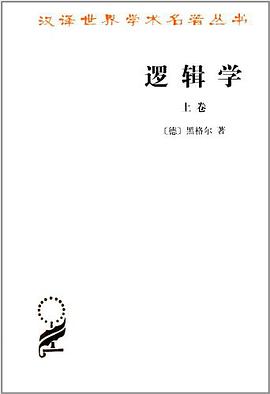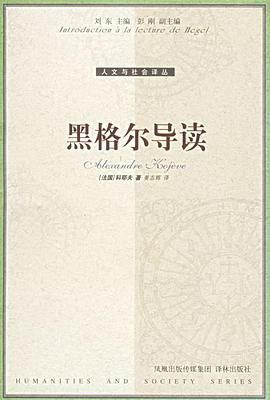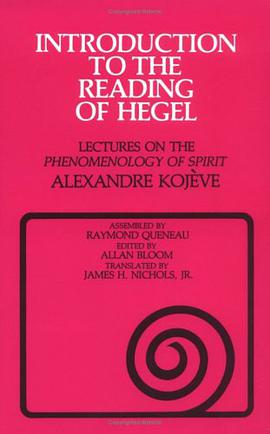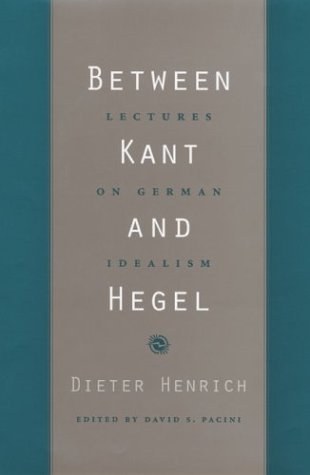Hegel
逻辑学(上卷) 豆瓣
Wissenschaft der Logik
7.8 (5 个评分)
作者:
黑格尔
译者:
杨一之
商务印书馆
2001
- 1
黑格尔(1770—1831),德国伟大的哲学家,德国古典哲学的集大成者。
黑格尔的《逻辑学》,通称《大逻辑》,以别于《哲学全书》的第一部分—《逻辑》,即通称的《小逻辑》。《逻辑学》分为“有论”、“本质论”和“概念论”三编。前两编合称为“客观逻辑”,第三编称为“主观逻辑”。这三个部分在黑格尔哲学中,通过他著名的辩证法而构成了紧密联系的统一体,体现了黑格尔认为逻辑学应当展开思维的客观结构和客观真理的思想。《逻辑学》是黑格尔最重要的代表作,影响了后世数种哲学潮流,例如马克思的历史唯物主义、存在主义等。
黑格尔的《逻辑学》,通称《大逻辑》,以别于《哲学全书》的第一部分—《逻辑》,即通称的《小逻辑》。《逻辑学》分为“有论”、“本质论”和“概念论”三编。前两编合称为“客观逻辑”,第三编称为“主观逻辑”。这三个部分在黑格尔哲学中,通过他著名的辩证法而构成了紧密联系的统一体,体现了黑格尔认为逻辑学应当展开思维的客观结构和客观真理的思想。《逻辑学》是黑格尔最重要的代表作,影响了后世数种哲学潮流,例如马克思的历史唯物主义、存在主义等。
黑格尔导读 豆瓣
Introduction à la lecture de Hegel
作者:
[法国] 亚历山大·科耶夫
译者:
姜志辉
译林出版社
2005
《黑格尔导读》是亚历山大·科耶夫1933年到1939年间在巴黎高等学校讲解黑格尔《精神现象学》的课程,它并不是纯粹的黑格尔的《精神现象学》的导读。在这部由他的学生的笔记整理而成的著作中,科耶夫融入了他自己的存在主义思想。因此,在某种程度上,这是一部独立的哲学著作。
为什么说科耶夫的黑格尔解读在20世纪的作品里可以为那么多人称颂?这在很大程度上是因为他揭示了黑格尔思想的当代意义,并且明确告诉人们,我们正在按照黑格尔的理念,走向历史的终结。科耶夫的一些话,说得十分精辟,比如他在冷战时期就断言"苏联人和中国人只是目前还贫穷的美国人而已"。这一席话,直到今天,依然警诫我们自己在世界上所处的位置……
为什么说科耶夫的黑格尔解读在20世纪的作品里可以为那么多人称颂?这在很大程度上是因为他揭示了黑格尔思想的当代意义,并且明确告诉人们,我们正在按照黑格尔的理念,走向历史的终结。科耶夫的一些话,说得十分精辟,比如他在冷战时期就断言"苏联人和中国人只是目前还贫穷的美国人而已"。这一席话,直到今天,依然警诫我们自己在世界上所处的位置……
在康德与黑格尔之间 豆瓣 Goodreads
Between Kant and Hegel: Lectures on German Idealism
作者:
[德]迪特·亨利希
译者:
乐小军
商务印书馆
2020
- 7
其它标题:
在康德与黑格尔之间(德国观念论讲座)(精)/当代德国哲学前沿丛书
《在康德与黑格尔之间:德国观念论讲座》是著名学者迪特·亨利希的一部重要著作,在这部著作中,作者讨论了德国哲学史上重要的哲学家的思想观念,包括康德、雅各比、赖因霍尔德、舒尔策、费希特、荷尔德林、黑格尔等。作者关注的主题是从康德的先验哲学到黑格尔的观念论的转变过程,准确地说,是关注那个时代出现的不同的主体概念,以及这些概念之间的传承、批判关系。
Introduction to the Reading of Hegel 豆瓣
作者:
Alexandre Kojève
译者:
James H. Nichols
Cornell University Press
1980
- 10
Between Kant and Hegel 豆瓣
作者:
Dieter Henrich
Harvard University Press
2003
- 10
Electrifying when they were first delivered in 1973, becoming legendary in the years since, as transcripts passed from hand to hand, Dieter Henrich's lectures on German idealism were the first contact a major German philosopher had made with an American audience since the onset of World War II. They remain, to this day, one of the most eloquent interpretations of the central philosophical tradition of Germany and the way in which it relates to the concerns of contemporary philosophy. Thanks to the editorial work of David Pacini, one of the original auditors of Henrich's course, the lectures appear here with annotations that link them to the editions of the masterworks of German philosophy as they are now available. </p>
Henrich describes the movement that led from Kant to Hegel, beginning with an interpretation of the structure and tensions of Kant's system. He locates the Kantian movement and revival of Spinoza, as sketched by F. H. Jacobi, in the intellectual conditions of the time and in the philosophical motivations of modern thought. And he explains the motives behind Fichte's Doctrine of Science. Henrich connects this history to the poet Hölderlin's original philosophy and to the thought of the founders of Romanticism, Novalis and Friedrich Schlegel. He concludes with an interpretation of the basic design of Hegel's system. </p>
Henrich describes the movement that led from Kant to Hegel, beginning with an interpretation of the structure and tensions of Kant's system. He locates the Kantian movement and revival of Spinoza, as sketched by F. H. Jacobi, in the intellectual conditions of the time and in the philosophical motivations of modern thought. And he explains the motives behind Fichte's Doctrine of Science. Henrich connects this history to the poet Hölderlin's original philosophy and to the thought of the founders of Romanticism, Novalis and Friedrich Schlegel. He concludes with an interpretation of the basic design of Hegel's system. </p>





